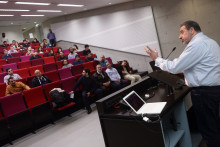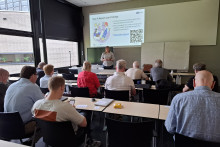Charlie Hebdo
‘People with different cultures and beliefs interact more than ever,’ says Ahmed Youssef, chairman of the association, as he introduces the subject of the lecture. To work with colleagues who have a different background than yours can be enriching, but often misconceptions appear as well. ‘The horrific crime against Charlie Hebdo once again highlighted the need to discuss freedom of expression in the Islam religion.’
Boundaries
Soliman starts his lecture by summarizing the main concepts of the Islam. ‘The Islam religion originates from a divine message, addressed to humanity as a whole. In order to suit every human being, this message does not impose any boundaries or limits,’ he explains. But when freedom and liberties of individuals collide, who should put the boundaries? ‘A democratic government will adopt legislation that serves the majority, but minorities will be suppressed,’ says Soliman. ‘When it comes to freedom of individuals, only God can decide on the limitations. The guidelines that are phrased in the Qur’an aim to protect human rights. In that sense it is even more complete than the UN declaration.’
Friendly atmosphere
With regard to freedom of speech, Soliman points out the key importance of reason in the Islam religion. ‘In Islam, the only acceptable way to deal with misconceptions and disbelief is debating in a friendly atmosphere. In fact, Islam is the only religion that encourages its believers to leave if they find truth somewhere else.’
In response to questions from the audience, Soliman strongly emphasizes that extremism and terrorist attacks are caused by oppression. ‘In Europe,’ he says, ‘more and more young Muslims become radicalized. This is a result of the double standards that European countries apply to Muslims compared to other religious groups. For example, the cartoons of the prophet Muhammad that were published in 2006 were allowed with reference to the Danish law on freedom of expression. But if instead the cartoonist had mocked the Jew religion, it would have sparked widespread controversy. This and more events make Muslims feel oppressed.’
Discussion
According to Soliman, discussion is also the only possible remedy against extremism. ‘People should be more sensitive and less offensive. I hate the cartoonists of Charlie Hebdo, because they tried to bully a minority. But I also hate those who killed them. What the cartoonists were doing was wrong, but we should ignore them. It should be allowed to criticize Muhammad, but not by drawing cartoons in a hostile atmosphere. Instead, criticism should be expressed in a friendly debate.’
‘I believe that ignorance is the enemy,’ Soliman concludes. ‘Don’t hate, educate.’
Those who are interested in learning more about the Islam religion and its perspective on women and terrorism, may contact the UT-Muslims association to receive a free dvd-box ‘The Fog is Lifting’, a production of the Bridges Foundation. E-mail: [email protected].









